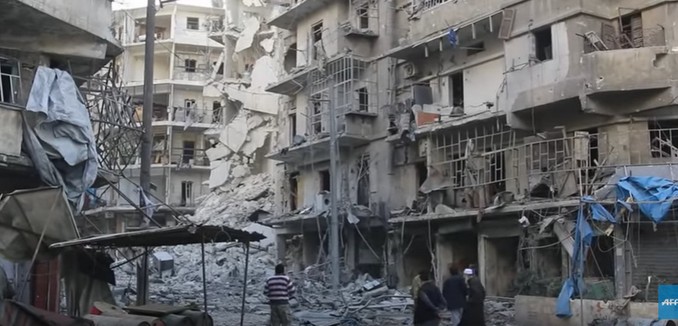Hospitals on the rebel-held eastern side of Aleppo are no longer able to provide medical care for the estimated 250,000 remaining residents after continued damage from bombings by Syrian government forces, The New York Times reported Monday.
It is uncertain whether any of the hospitals will be able to reopen, leaving eastern Aleppo residents dependent on small clinics. According to the World Health Organization, “residents no longer have access to trauma care, major surgeries, and other consultations for serious health conditions.”
“We no longer have hospitals to operate in,” eastern Aleppo’s last neurosurgeon, identified only as Dr. Omar due to safety concerns, told the Times. “You can’t imagine what it’s like living in Aleppo right now. It feels like we are living in hell. Our neighborhoods are in flames, and bombs are raining down from the sky. We urgently call on the international community to send help.”
According to the Times, both the rebels and the civilians in eastern Aleppo believe that “the Syrian government has resolved to press forward regardless of the humanitarian cost, and to gamble that Western countries, particularly the United States, will not stop them.”
An Al-Jazeera video (embedded below) taken during the bombing of a children’s hospital shows children with oxygen masks, apparently victims of a chlorine attack, and premature babies being taken from their incubators and being place in a blanket. In one scene a father is seen mourning his young son. “I’ve lost everything, oh, Ahmad,” he said. “I’ve lost everything, you are my life.”
According to Mohamed Kahil, the head of the forensic facility in the eastern part of Aleppo, the bombings has forced medical teams to move “to basements, to streets, to houses….The medics and staff are still functioning with high energy, but under harsh conditions.”
Staffan de Mistura, the United Nations’ special representative for Syria, has traveled to Syria to urge the government to let up on the bombing and allow humanitarian aid a guarantee of safe passage. The plan was supported by some rebel groups but rejected by the government. Syrian Foreign Minister Walid al-Moallem would not even agree to a humanitarian pause without guarantees from nations supporting the rebel groups.
The German government harshly criticized Iran and Russia for their support of the Syrian government. “It’s obviously the Russian and Iranian support for the … Syrian regime which has caused a dramatic worsening of the situation for the population,” German government spokesman Steffen Seibert told reporters on Monday. When asked about the possibility of sanctions against Iran and Russia for their actions, Seibert said that “all options must remain on the table.”
The Syrian government has implemented a scorched-earth military plan in order to force primarily Sunni residents to flee areas that the government seeks to control. Hanin Ghaddar, a visiting fellow at the Washington Institute for Near East Policy, described this tactic in September as “moving from ‘starve or surrender’ to ‘war or surrender’ tactics in order to eliminate any Sunni presence around Damascus as soon as possible.” The tactic involves denying food and medical care to residents of targeted areas until they surrender. Food, water, and medical services are all now in short supply in eastern Aleppo, and safe passage is impossible.
In October, The Guardian outlined Iran’s goal in helping the Syrian government recapture Aleppo: It would give Iran a route “across Arab Iraq, through the Kurdish north, into Kurdish north-eastern Syria and through the battlefields north of Aleppo, where Iran and its allies are prevailing on the ground,” and from there to Homs and the port city of Latakia. This could give Iran a land route connecting it to the Mediterranean Sea.
[Photo: afpbr / YouTube ]




